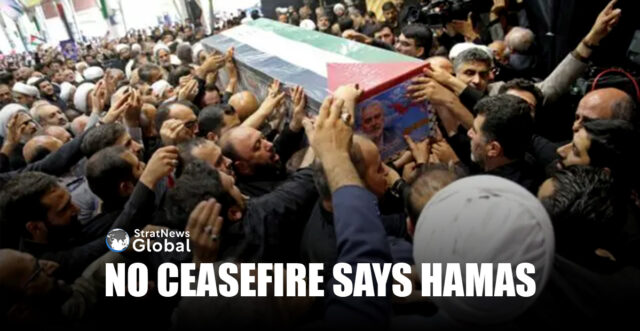Hamas, the Palestinian Islamist group, announced on Wednesday that it will not participate in the upcoming Gaza ceasefire talks scheduled for Thursday in Qatar. This decision casts doubt on the possibility of reaching a negotiated truce, which some Iranian sources suggest could prevent an Iranian attack on Israel.
Despite Hamas’ refusal, the United States expects the indirect talks in Doha to proceed as planned. U.S. officials remain hopeful that a ceasefire agreement can still be achieved. However, Axios reported that U.S. Secretary of State Antony Blinken has postponed his anticipated trip to the Middle East, which was supposed to begin on Tuesday.
Three senior Iranian officials have indicated that a ceasefire deal in Gaza is the only thing that could prevent Iran from retaliating against Israel. The assassination of Hamas leader Ismail Haniyeh on Iranian soil last month has heightened tensions.
Israel Wants Talks, Hamas Demands Implementation
The Israeli government has confirmed that it will send a delegation to Thursday’s talks. However, Hamas insists on the implementation of a proposal it has already accepted, rather than entering into further negotiations.
“Hamas is committed to the proposal presented on July 2, based on the U.S. Security Council resolution and Biden’s speech. The movement is ready to discuss mechanisms to implement it immediately,” stated Sami Abu Zuhri, a senior Hamas official.
“Entering new negotiations allows the occupation to impose new conditions and use the talks to commit more massacres,” he added.
Intensified Fighting in Gaza
Meanwhile, residents in Khan Younis reported that Israeli forces blew up homes and increased tank shelling in the city’s eastern areas. Israel stated that it was responding to Hamas rocket fire towards Tel Aviv and had targeted 40 military sites, including rocket launch pads and militants in central Gaza, Khan Younis, and Rafah.
Hamas and Islamic Jihad militants claimed to have attacked Israeli forces in multiple locations. Palestinian health officials reported that Israeli strikes had killed at least 14 people on Wednesday, mainly in the center and south of Gaza. Hamas also confirmed that its fighters were engaged in fierce clashes with Israeli forces in the Israeli-occupied West Bank.
A ceasefire agreement aims to end the fighting in Gaza and secure the release of Israeli hostages held by Hamas in exchange for Palestinian prisoners in Israel. However, both sides remain at odds over the sequence and terms of the deal.
Hamas demands an end to the war and the withdrawal of Israeli forces from Gaza as a precondition for releasing hostages. On the other hand, Israeli Prime Minister Benjamin Netanyahu insists on continuing the fight until Hamas is eradicated, agreeing only to a temporary pause to secure the return of hostages.
Regional Tensions and Diplomatic Efforts
In an effort to prevent a separate escalation between Hezbollah, backed by Iran, and Israel, Amos Hochstein, a senior adviser to U.S. President Joe Biden, arrived in Beirut on Wednesday. Hochstein is set to meet with Lebanese caretaker Prime Minister Najib Mikati and parliament speaker Nabih Berri, who leads the Amal movement, an ally of Hezbollah.
“We are facing uncertain opportunities for diplomacy, which is now focused on preventing war and stopping Israeli aggression,” Mikati said in a speech on Wednesday.
Mikati also noted that talks with Arab and Western leaders have intensified, reflecting the seriousness of the situation in Lebanon and the broader region.
With Reuters inputs
Thirty eight years in journalism, widely travelled, history buff with a preference for Old Monk Rum. Current interest/focus spans China, Technology and Trade. Recent reads: Steven Colls Directorate S and Alexander Frater's Chasing the Monsoon. Netflix/Prime video junkie. Loves animal videos on Facebook. Reluctant tweeter.





